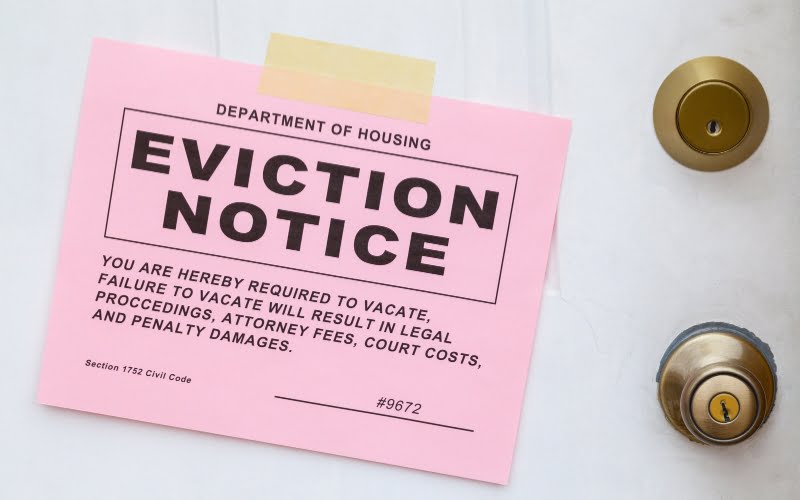Last Updated on March 18, 2024 by Kelvin Nielsen
In Arizona, the 5 Day Notice to Vacate serves one particular purpose – to evict a tenant for nonpayment of rent! If you are a landlord looking to evict a tenant for failure to pay rent, here is everything you need to know.
The lease agreement obligates tenants to abide by certain terms, including payment of rent. If the tenant fails to do so, the landlord may be able to use that as a legal justification to evict them from their property.
In Arizona, all evictions follow the same process. The following is a quick rundown of what the process entails.
- Have a legal justification to evict the tenant. Examples of legal justifications include nonpayment of rent, health or safety violations, illegal activity, and no lease.
- Serve the tenant with the appropriate eviction notice.
- Move to court to file a lawsuit if the matter remains unresolved.
- Wait for the tenant to respond.
- Attend the court hearing for judgment.
- Obtain possession of the property if the judgment is in your favor.
Please note that the only way to evict a tenant from your property is through a court order. You must desist from engaging in illegal eviction tactics such as retaliatory, discriminatory, or self-help methods.
The following is everything you need to know about the 5 day notice to vacate in Arizona.
5 Day Notice to Vacate Arizona
Is your tenant late on paying rent? If so, you can serve them a 5 Day Notice to Vacate/Quit. The notice will give the tenant up to 5 calendar days to either pay the rent due or move out.
Unless the lease states otherwise, rent is usually due at the start of every pay period and becomes late the day after. And unlike some other states, tenants have no right to a grace period. Also, there are no exceptions for weekends and holidays.
5 Day Notice to Vacate – What to do if the Tenant Doesn’t Move Out?
If the tenant fails to honor the notice, the following is the step-by-step process that you should take to resolve the matter legally.
Step #1: File a complaint in either a Justice Court or the Superior Court.
After the 5 days are over, you can escalate the matter further by going to court. You can file the lawsuit (Forcible Entry Detainer) in either a Justice Court or the Superior Court depending on the size of the lawsuit.
If you’re suing the tenant for below $10,000, you must file the lawsuit in a Justice Court. But if the amount exceeds $10,000, then you must do the filing in a Superior Court. This will set you back by $35 and $218, respectively.
Step #2: The tenant is served.
After your lawsuit has been notarized by the court’s clerk, copies of the Summons and Complaint will be issued. These will then need to be served to the tenant using a process server.
The process server, typically a sheriff or a constable, will need to serve the documents in a particular manner. The following are the options.
- Serve a copy in person.
- Leave a copy with someone of suitable age who lives with the tenant.
- Deliver a copy to the tenant’s attorney, or any other agent authorized to act on their behalf.
You can generally expect the court hearing to be held no later than 5 days after filing the complaint.
Step #3: The tenant files an answer.
Arizona tenants have a right to respond to their landlord’s allegations. The tenant must submit the answer on or before the initial appearance.
The tenant can choose to fight or admit the landlord’s allegations. If the tenant chooses to fight their eviction, the following are some of the defenses they can give against their eviction for nonpayment of rent.
- The eviction notice you served them had critical errors. For instance, it failed to mention the effective date of eviction.
- The eviction notice was served irregularly.
- The tenant paid the due rent within the five days required by the notice. That is, within five calendar days.
- The eviction is an act of retaliation against the tenant for exercising their legal rights. For example, the tenant failed to pay rent because they were withholding it until necessary repairs were made. (The state of Arizona allows tenants to do so).
- The eviction is discriminatory. In other words, you’re trying to evict the tenant due to their race, color, nationality, sex, or any other protected class under Federal or state fair housing laws.
- The tenant paid rent on time and you’re simply harassing them.
- The tenant withheld rent payments because you failed to make necessary repairs.
Step #4: The tenant files a counterclaim.
In addition to filing an answer, the tenant can also file a counterclaim. Tenants get to do so if they believe that the landlord owes them money because of a lease violation.
Lease violations that can lead to counterclaims in Arizona include the following.
- Noncompliance with the terms of the lease
- Habitability issues that impact the tenant’s health or safety.
- Violations of the state’s landlord-tenant act.
- Acts that can qualify as retaliatory against the tenant.
- Illegal eviction methods, such as using self-help means to evict the tenant.
Step #5: Hearing is held.
Once the complaint is successfully filed, you can expect the hearing to take place within 5 days. Both parties have the option to make the initial appearance via phone or video conference.
The judge can rule in your favor if any of the following happens.
- The tenant shows up and pleads guilty.
- The tenant fails to show up.
- The tenant fails to convince the court by not having a valid defense.
- The judgment falls in your favor after all parties have submitted their case.
If the judgment is in your favor, the court will issue you with a Writ of Restitution. This will give the tenant 5 calendar days to move out after the judgment is entered. The only exception here is if the tenant files an appeal.
Frequently Asked Questions (FAQs): 5 Day Notice to Vacate Arizona
Q: What happens after 5 day notice in AZ?
A: What follows will depend on the action the tenant has taken. If they honor the lease and either pay the rent due or move out, then no further eviction proceedings would be necessary. However, if the tenant chooses neither to pay the rent due nor move out within 5 days, then the landlord may have no other option but to file an eviction complaint.
Q: Can a landlord evict you in 5 days in Arizona?
A: Yes! A landlord in Arizona can evict a tenant in 5 days due to nonpayment of rent.
Q: How long does it take to evict a tenant in AZ?
A: Generally speaking, it’ll take between one and six weeks for an eviction to complete in Arizona. The process may also take longer if the tenant files a legal defense, requests a postponement of the eviction hearing, or if the eviction process is marred with significant errors.
Q: What is a 30-Day Eviction Notice Arizona?
A: This is another type of notice that landlords in Arizona can serve tenants with an eviction. The 30 Day Eviction Notice applies in situations where the tenant has no lease or is paying rent on a month-to-month basis.
Q: How far behind on rent before eviction in Arizona?
A: In Arizona, unless the lease states otherwise, rent is due on the 1st day of every month. It, therefore, becomes late the next day.
Conclusion
The 5 Day Notice to Vacate applies in situations where the landlord is looking to evict a tenant for nonpayment of rent. You must follow the eviction process diligently for it to be successful.
Disclosure: The content herein isn’t a substitute for advice from a professional attorney. It’s only meant to serve educational purposes. If you have a specific question, kindly seek expert attorney services.
Sources: https://www.nolo.com/legal-encyclopedia/the-eviction-process-arizona-rules-landlords-property-managers.html, https://azevictionhelp.org/eviction-process/pre-hearing/non-payment-notice-residential, https://www.azcourts.gov/legalinfohub/Legal-Info-Hub/Legal-Info-Sheets/Legal-Info-Sheets-Landlord-Tenant-Disputes-Eviction/Non-Payment-of-Rent,

Hi, I’m Kelvin Nielsen, an experienced landlord and accomplished real estate lawyer. My focus is on answering your questions about renting in the hopes of making your life as a renter or a landlord a bit easier.







